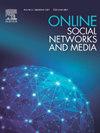智能推动真相:用行为策略减轻社交网络中的谣言和错误信息
IF 2.9
Q1 Social Sciences
引用次数: 0
摘要
在紧急情况和自然灾害期间,社交网络在传播信息方面发挥着至关重要的作用,但它们也促进了谣言和错误信息的传播,这可能对社会产生不利影响。社交网络上流传着大量与新冠肺炎相关的虚假信息,造成了不必要的恐惧和焦虑,并导致了各种心理健康问题。尽管社交网络提供商和政府当局采取了严格的措施来遏制假新闻,但许多用户继续成为错误信息的受害者。这凸显了在社交网络上需要采用新颖的方法,将用户参与纳入减少谣言的范围。由于用户是信息的主要消费者和传播者,他们的参与对于保持信息卫生至关重要。我们提出了一种基于轻推理论的新方法,以激励用户在其社交网络档案中只发布或分享经过验证的信息,从而积极影响他们的信息共享行为。我们的方法采用三种助推策略:对抗助推、强化助推和社会影响助推。我们为Twitter开发了一个Chrome浏览器插件,提示用户在分享之前验证推文的真实性并对其进行评级。此外,用户配置文件会根据他们发布的tweet的平均评级获得评级。在一项涉及125名Twitter用户的为期一个月的实地研究中,对这一机制的有效性进行了测试。结果表明,所提出的方法是一种有希望的解决方案,以限制谣言在社交网络上的传播。本文章由计算机程序翻译,如有差异,请以英文原文为准。
Intelligent nudging for truth: Mitigating rumor and misinformation in social networks with behavioral strategies
Social networks play a crucial role in disseminating information during emergencies and natural disasters, but they also facilitate the spread of rumors and misinformation, which can have adverse effects on society. Numerous false messages related to the COVID-19 pandemic circulated on social networks, causing unnecessary fear and anxiety, and leading to various mental health issues. Despite strict measures by social network providers and government authorities to curb fake news, many users continue to fall victim to misinformation. This highlights the need for novel approaches that incorporate user participation in mitigating rumors on social networks. Since users are the primary consumers and spreaders of information, their involvement is essential in maintaining information hygiene. We propose a novel approach based on nudging theory to motivate users to post or share only verified information on their social network profiles, thereby positively influencing their information-sharing behavior. Our approach utilizes three nudging strategies: Confront nudge, Reinforcement nudge, and Social Influence nudge. We have developed a Chrome browser plug-in for Twitter that prompts users to verify the authenticity of tweets and rate them before sharing. Additionally, user profiles receive a rating based on the average ratings of their posted tweets. The effectiveness of this mechanism was tested in a field study involving 125 Twitter users over one month. The results suggest that the proposed approach is a promising solution for limiting the propagation of rumors on social networks.
求助全文
通过发布文献求助,成功后即可免费获取论文全文。
去求助
来源期刊

Online Social Networks and Media
Social Sciences-Communication
CiteScore
10.60
自引率
0.00%
发文量
32
审稿时长
44 days
 求助内容:
求助内容: 应助结果提醒方式:
应助结果提醒方式:


